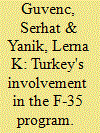|
|
|
Sort Order |
|
|
|
Items / Page
|
|
|
|
|
|
|
| Srl | Item |
| 1 |
ID:
134778


|
|
|
|
|
| Summary/Abstract |
With its automobile exports measured in millions of units annually, Turkey has become one of the top automobile producing nations in Europe. The current state of the Turkish motor vehicle industry stands in contrast to its modest origins, which can be traced back to the early years of the Cold War. In the 1950s, a private company ventured into the business of assembling Willy's Jeeps in Turkey. The early developmental trajectory of the Turkish automobile manufacturing resembled the experiences of many other countries that resorted to import substitution to reduce foreign currency dependency for automobile imports. However, it differed significantly from others in two ways. First, it was not undertaken in response to a coordinated government policy, but rather as a one-off private initiative. Second, it was justified in the context of the Cold War military and strategic requirements. In other words, it stands out among its contemporaries in terms of the prominence of military and defense considerations that shaped US and Turkish military views on a private venture during the Cold War. Although the Jeep assembly experience in Turkey ended in failure, its products had remained in service in the Turkish Army for nearly 50 years, surviving the Cold War and beyond. The experience also left its deep imprint on Turkey's pursuit of an indigenously designed and manufactured automobile.
|
|
|
|
|
|
|
|
|
|
|
|
|
|
|
|
| 2 |
ID:
148644


|
|
|
|
|
| Summary/Abstract |
The recent revival of academic and popular interest in the Korean War in Turkey has played an important role in instigating the production of new books and documentaries. In Turkish accounts the Battle of Kunu-ri (November 1950) figures more prominently than any other event during the entire conflict. However, the Turkish Brigade’s performance at this battle remains controversial. This paper assesses the impact of U.S. military assistance on Turkish military’s transformation, compares and contrasts the official U.S. and Turkish accounts of the battle (known in U.S. sources as the Battle of Chongchon), and discusses why the official perspectives of the engagement diverge substantially.
|
|
|
|
|
|
|
|
|
|
|
|
|
|
|
|
| 3 |
ID:
089119


|
|
|
|
|
| Publication |
2009.
|
| Summary/Abstract |
This paper is aimed at introducing the inter-war dimension to the debate on the history of Turkey's association with the idea of European integration. This association evolved in the context of two inter-war initiatives: Aristide Briand's European Union proposal within the framework of the League of Nations and Richard Coudehove-Kalergi's Pan-Europe idea. Although Turkey had been originally excluded from both, the inter-war great power rivalries in Europe rectified the situation, allowing Turkey's incorporation into both schemes. In the process, the Turkish leaders and public could relate to Briand's intergovernmental initiative far more easily than to Coudenhove-Kalergi's Pan-Europe ideal. This might be considered a manifestation of traditional Turkish emphasis on institutional, rather than ideational, aspect of European integration.
|
|
|
|
|
|
|
|
|
|
|
|
|
|
|
|
| 4 |
ID:
121245


|
|
|
|
|
| Publication |
2013.
|
| Summary/Abstract |
Turkey has been involved in the international consortium that builds the
F-35 Joint Strike Fighter (JSF) since 1999. The relationship between Turkey
and the consortium may appear to be rocky, however, because of Turkey's
many hesitations to commit to the JSF program. In this article we argue that
these hesitations are strategic, designed to extract maximum benefits for
Turkey's defence industry from the consortium manufacturing the fighter
jets. For in addition to wanting to buy these fighter jets, Turkey seeks to
maximize the amount of local work-share to secure access to the software
of the aircraft, and to accumulate enough experience that will eventually
lead to designing and manufacturing a "fully indigenous" combat aircraft.
|
|
|
|
|
|
|
|
|
|
|
|
|
|
|
|
|
|
|
|
|